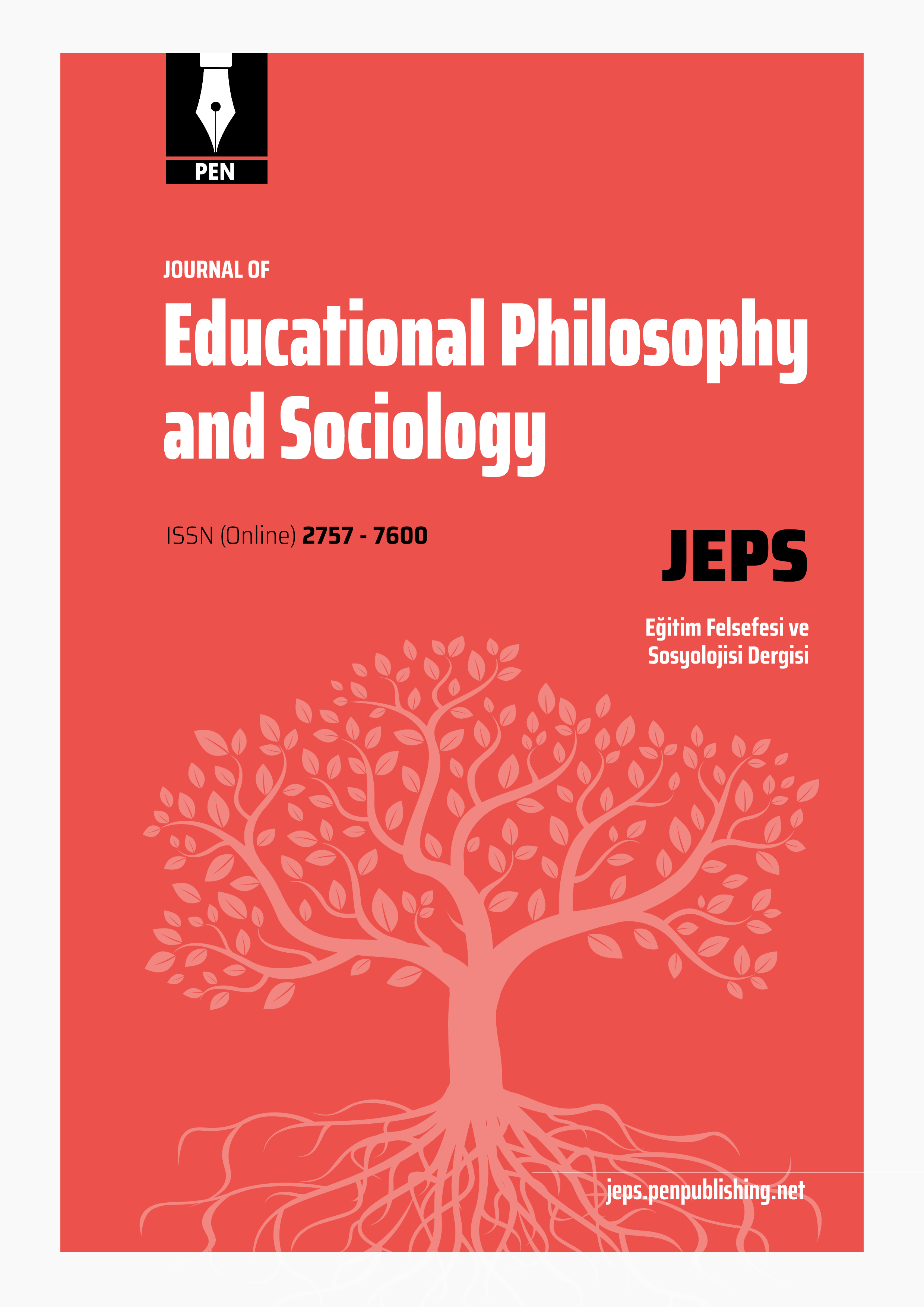- Aktay, A., & Ekşi, H. (2009). Yönetici ve öğretmenlerin değer tercihleri ile örgütsel vatandaşlık davranışları arasındaki ilişki. İş Ahlakı Dergisi, 2(3), 19-65. http://isahlakidergisi.com/sayilar/2-cilt-1-sayi/m0014 [Google Scholar]
- Balcı, A. (1993). Etkili okul kuram, uygulama ve araştırma. Yavuz dağıtım. [Google Scholar]
- Balcı, A. (2022). Açıklamalı eğitim yönetimi terimleri sözlüğü. Pegem Akademi. ISBN: 978-605-364-074-5 [Google Scholar]
- Baltacı, A. (2020). Okul müdürü öz yeterlik algısı ölçeğinin Türkçe’ye uyarlanması. Journal of Humanities and Tourism Research,10(1), 27–40. http://johut.karabuk.edu.tr/DergiTamDetay.aspx?ID=731 [Google Scholar]
- Büyüköztürk, Ş., Kılıç Çakmak, E., Akgün, Ö. E., Karadeniz, Ş., & Demirel, F. (2014). Bilimsel araştırma yöntemleri. Pegem Akademi Yayıncılık. [Google Scholar]
- Creswell, J. W. (2012). Educational research: Planning, conducting, and evaluating quantitative and qualitative research. Boston, MA: Pearson. [Google Scholar]
- Creswell, J. W., & Poth, C. N. (2016). Qualitative inquiry and research design: Choosing among five approaches. Sage Publications. [Google Scholar]
- Çelikten, M. (2004). Bir okul müdürünün günlüğü. Fırat Üniversitesi Sosyal Bilimler Dergisi, 14(1), 123-135. https://search.trdizin.gov.tr/tr/yayin/detay/3624/bir-okul-mudurlugunun-gunlugu [Google Scholar]
- Çoban, G. S. (2018). Bilim ve Sanat Merkezleri yöneticilerinin yaşadıkları zorluklar ve çözüm yollarına ilişkin görüşleri: İstanbul örneği. [Yüksek Lisans Tezi, İstanbul Kültür Üniversitesi]. [Google Scholar]
- Demirel, İ. N. (2018). Eğitim liderinin etkileme gücü. EKEV Akademi Dergisi, 0(73), 293-302. https://dergipark.org.tr/tr/pub/sosekev/issue/71391/1147983 [Google Scholar]
- Demirtaş H., & Özer N. (2014). Okul müdürlerinin bakış açısıyla okul müdürlüğü. Kastamonu Eğitim Dergisi, 22(1), 1-24. https://dergipark.org.tr/tr/pub/kefdergi/issue/22603/241527 [Google Scholar]
- Eren, H. (2022). Denizli ili kale ilçesinde görev yapan okul müdürlerinin Bilim ve Sanat Merkezi (BILSEM) işleyişine ilişkin görüşleri. Pamukkale Üniversitesi Eğitim Bilimleri Enstitüsü. https://hdl.handle.net/11499/38981 [Google Scholar]
- Ergün. M. (1992). Eğitim ve toplum. Ocak Yayınları. [Google Scholar]
- Fryand, F., & Hale, S. (1996). Processing speed, working memory, and fluid intelligence: Evidence for a developmental cascade. The American Psychologist Society, 7(4), 237–241. https://www.jstor.org/stable/40062952. [Google Scholar]
- Gagne, F. (1999). Is there any light at the end of the tunnel?. Journal for the Education of the Gifted, 22(2), 191-229. doi:10.1501/Ozlegt_0000000174. [Google Scholar] [Crossref]
- Gareis, C. R., & Tschannen-Moran, M. (2005). Cultivating principals’ sense of efficacy: Supports that matter. Paper to be presented at the annual meeting of the University Council for Educational Administration, Nashville, TN. http://coe.ksu.edu/ucea/2005/TschannenUCEA2005.pdf [Google Scholar]
- Gencer, M. (2021). Öğrencilerin okul ve okul müdürü kavramlarına ilişkin metaforik algıları. Kalem Eğitim ve İnsan Bilimleri Dergisi, 11(2), 729-754. https://doi.org/10.23863/kalem.2021.222. [Google Scholar] [Crossref]
- Glesne, C. (2013). Nitel araştırmaya giriş (A. Ersoy & P. Yalçınoğlu). Anı Yayıncılık. ISBN: 9786054434992 [Google Scholar]
- Halstead, J. M., & Taylor, J. M. (2000). Learning and teaching about values: a review of recent research. Cambridge Journal of Education, 30(2),169–202. https://doi.org/10.1080/713657146 [Google Scholar] [Crossref]
- Jolly, J. L. (2009). Historical perspectives: The national defense education act, current STEM initiative, and the gifted. Gifted Child Today,32(2), 50-53.doi:10.17522/balikesirnef.529898 [Google Scholar] [Crossref]
- Karstanje, P., & Webber, C. F. (2008). Programs for schools principal preparation in East Europe. Journal of Educational Administration, 46(6), 739-751. doi:10.1108/09578230810908325 [Google Scholar] [Crossref]
- Kaya, N. G. (2013). Üstün yetenekli öğrencilerin eğitimi ve BILSEM’ler. Erzincan Üniversitesi Eğitim Fakültesi Dergisi, 15(1), 115-122. https://dergipark.org.tr/tr/pub/erziefd/issue/6010/79706 [Google Scholar]
- Kazu, İ. Y., & Şenol, C. (2012). Üstün yetenekliler eğitim programlarına ilişkin öğretmen görüşleri (BILSEM Örneği). e-Uluslararası Eğitim Araştırmaları Dergisi, 3(2), 13-35. https://www.acarindex.com/e-uluslararasi-egitim-arastirmalari-dergisi/ustun-yetenekliler-egitim-programlarina-iliskin-ogretmen-gorusleri-BILSEM-ornegi-1218334 [Google Scholar]
- McNeely, A. C., Nonnemaker, J., M., & Blum, R. W. (2002). Promoting school connectedness: Evidence from the national longitudinal study of adolescent health. Journal of School Health, 72(4), 138–146. doi: 10.1111/j.1746-1561.2002.tb06533.x [Google Scholar] [Crossref]
- MEB, (2021). Milli eğitim bakanlığına bağlı eğitim kurumlarına yönetici seçme ve görevlendirme yönetmeliği. Resmi Gazete, Sayı 31386. https://www.resmigazete.gov.tr/eskiler/2021/02/20210205-1.htm [Google Scholar]
- Merriam, S. B. (2002). Qualitative research in practice: Examples for discussion and analysis. San Francisco, CA: Jossey-Bass Publishers. [Google Scholar]
- Miles, M. B., & Huberman, A. M. (1994). Qualitative data analysis: An expanded sourcebook. London, United States of America: SAGE. [Google Scholar]
- Önen, Ö. & Eryılmaz-Ballı, F. (2020). Z kuşağı ortaokul öğrencilerinin okul müdürlerine dair algılarının incelenmesi, EKEV Akademi Dergisi, 0(84), 529-550. https://dergipark.org.tr/tr/pub/sosekev/issue/71841/1155727 [Google Scholar]
- Özer, M. (2020). Türkiye’de özel yeteneklilere yetenek geliştirme desteğinde Bilim ve Sanat Merkezleri: Mevcut durum ve iyileştirme alanları. Uluslararası Toplum Araştırmaları Dergisi 17(33), 729-749. https://doi.org/10.26466/opus.810856 [Google Scholar] [Crossref]
- Pemik, K. ve Levent, F. (2019). Üstün yetenekli öğrencilere destek odasında verilen eğitime ilişkin okul yöneticilerinin ve öğretmenlerin görüşleri. Ankara Üniversitesi Eğitim Bilimleri Fakültesi Özel Eğitim Dergisi, 20(2), 313-338. https://doi.org/10.21565/ozelegitimdergisi.446598 [Google Scholar] [Crossref]
- Saban, A. (2008). Okula ilişkin metaforlar. Kuram ve Uygulamada Eğitim Yönetimi Dergisi, 14(3), 459-496. https://dergipark.org.tr/tr/pub/kuey/issue/10342/126702 [Google Scholar]
- Ministry of Industry and Technology (2017). İllerin ve bölgelerin sosyo-ekonomik gelişmişlik sıralaması araştırması [the Socio-Economic Development Ranking Studies] ((SEGE-2017), Kalkınma Ajansları Genel Müdürlüğü, Ankara. [Google Scholar]
- Şahin, F., & Levent, F. (2015). Examining the methods and strategies that classroom teachers use in the education of gifted students. The Online Journal of New Horizons in Education, 3(5), 73-82. [Google Scholar]
- Taymaz, H. (1985). Okul Yönetimi. Pegem Yayınevi. [Google Scholar]
- Tunç, E., & Beşaltı, M. (2015). Okul yaşam kalitesinin bazı değişkenlere göre incelenmesi. Turkish Journal of Education, 3(4), 28-39. doi:10.19128/turje.181090. [Google Scholar] [Crossref]
- Turan, S., Yıldırım, N., & Aydoğdu, E. (2012). Okul müdürlerinin kendi görevlerine ilişkin bakış açıları. Pegem Eğitim ve Öğretim Dergisi, 2(3), 63-76. https://dergipark.org.tr/tr/pub/pegegog/issue/22588/241264. [Google Scholar]
- Ültay, E., Akyurt, H., & Ültay, N. (2021). Sosyal bilimlerde betimsel içerik analizi. IBAD Sosyal Bilimler Dergisi, (10), 188-201. https://doi.org/10.21733/ibad.871703 [Google Scholar] [Crossref]
- Viera, A. J. ve Garrett, J. M. (2005). Understanding interobserver agreement: The kappa statistic. Family Medicine, 37(5), 360-363. [Google Scholar]
- Wildy, H., Clarke, S. R. P., & Slater, C. (2007). International perspectives of principal preparation: How does Australia fare? Leading & Managing Special Edition, 13(2), 1–14. [Google Scholar]
- Yıldırım, A., & Şimşek, H. (2005). Sosyal bilimlerde nitel araştırma yöntemleri. Seçkin Yayıncılık. ISBN 9750200071. http://eku.comu.edu.tr/index/2/2/etopkaya.pdf. [Google Scholar]
|
